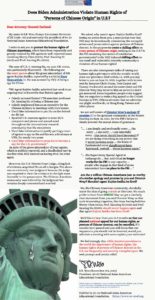I have always admired great efforts by S. B. Woo, president of 80-20 Educational Foundation (https://www.80-20ef.org/), who has been standing up and fighting for Asian Americans. Recent trends of a new type of McCarthyism have been disrupting the academic world in US. In particular, too many scientists of Chinese descent have been wrongly charged and their human rights have been grossly violated due to repeated wrong doings of FBI. Below is the open letter by Dr. Woo asking for protection of the rights of Chinese Americans in US and it will appear as a full-page ad at the back page of Section A of Wall Street Journal and Politico on Feb. 10 (Thursday). It does not even include the most recent case against Dr. Gang Chen, an MIT professor, which was just dropped a few days ago. A more readable text version of the letter can be seen here.
Category: Open Science
Support scientific startups for transformative research
We discussed how we should fund high-risk high-reward proposals of novel ideas, proposing a new review system for transformative research. Here we continue to talk about how startup scientists, who originate most of the disruptive ideas as history has shown, should be supported. The business world has an effective system of venture capital and angel investment for fostering risky startup companies. The academic community can certainly learn from their experience.
Continue reading “Support scientific startups for transformative research”
A new review system for high-risk high-reward scientific proposals
Scientific advancement includes two types: one is incremental and the other is transformative. The incremental one is typically consists of conservative small improvements based on widely agreed frameworks or principles. Obviously, effort of this type is easy to gain support from the community. Contrarily, the transformative one involves disruptive / unorthodox ideas which more often lie outside of the box of our collective thinking or even break some existing principles. Not surprisingly, these kind of so-called high-risk / high-reward ideas and studies are difficult to get funded, especially in the beginning. To balance both types of efforts, open science practices are in need.
Continue reading “A new review system for high-risk high-reward scientific proposals”
A crackpot’s counter-statement
Some physicists have labeled me as a crack pot when considering my works on the new theoretical framework of mirror matter theory. However, I disagree in the spirit of scientific principles. With three papers published in esteemed journals, seven invited seminars by unrelated people (or more than 10 in total), and grant-seeking in collaboration with several different groups, I don’t think that it is fair to categorize my work on this topic as crackpottery. It is not, especially when considering the unique concrete predictions from my new model that can be readily tested in the laboratory using existing technologies.
New blog to continue my mission on open science and mirror matter theory
Under enormous pressures, I had to close my former blog hosted at Notre Dame. This is my new blog site that contains all my previous posts and articles. And I will continue my advocacy of open science principles and studies on the new mirror matter theory. I wish that the right of academic freedom and freedom of speech would not have to be such a luxury, at least in the United States. Join me if you believe in freedom and openness in both science and society.
Is arXiv a monopoly bully in scientific publication?
After decades of ever-increasing dominance, arXiv.org has become the largest and most popular storage space or eprint service for scientific publications in physics and other related fields. It would have been the most beneficial to the physics community had arXiv sticked to its original principles for sharing new ideas and works quickly. Sadly, arXiv.org is becoming more and more arrogant these days instead. Veiled censorship by arXiv is making it just like another giant refereed journal system but without any transparency.
Continue reading “Is arXiv a monopoly bully in scientific publication?”Over-moderation makes arXiv.org another refereed journal
I just so happened to stumble upon a very interesting comment on arXiv’s moderation issues (certainly more interesting than the original blog article). I could not agree more with the commenter. It is almost exactly like what I would like to write about the issue but probably not as well as the anonymous commenter articulated. In particular, I made similar comparisons between science and business; startup companies vs. researchers with risky/novel scientific ideas, etc. I can not help but fully quote the comment here,
Continue reading “Over-moderation makes arXiv.org another refereed journal”How should private foundations support science?
It is amazing that there exist quite some private foundations in the United States who care about science and are enthusiastic about funding scientific projects. However, a lot of them, if not all, don’t seem to know how they should support science in a complementary way when compared to government funding agencies like NSF and DoE.
Continue reading “How should private foundations support science?”
Time to reform peer-review
One of the critical features in scientific research is the application of the so-called peer-review process before a scientific paper is officially published in a journal. Ideally, peer-review, at least seemingly in its original purpose, should serve as a measure of quality control that benefits both the authors and the readers. However, nowadays, it becomes more and more like an obstruction to the advancement of science, in particular, in terms of radically new ideas and directions.
Continue reading “Time to reform peer-review”How can a new idea be accepted by eminent physicists?
In a nostalgic review article titled “Twenty years of the Weyl anomaly” [Michael J Duff, Class. Quantum Grav. 11, 1387 (1994)], Duff recalled the history of his discovery of the Weyl or conformal anomaly in quantum theory with Derek Capper. Continue reading “How can a new idea be accepted by eminent physicists?”

